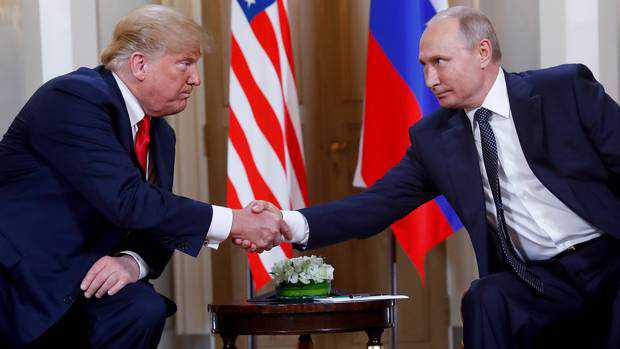Trump delays proposed Putin meeting until 2019
27 July, 2018

The Trump administration on Wednesday sought to fend off accusations the president is too soft on Russia, putting off a proposed second summit with Russian leader Vladimir Putin and declaring the U.S. will never recognize Russia’s 2014 annexation of Crimea.
As members of the Senate Foreign Relations Committee peppered Secretary of State Mike Pompeo with demands for details about last week’s summit in Finland, the White House said President Donald Trump had opted against trying to arrange another meeting with Putin this fall. Putin already had sent signals that he wasn’t interested in coming to Washington.
National security adviser John Bolton cited special counsel Robert Mueller’s investigation into Russian interference in the 2016 election as the reason for the delay, although many members of Congress had objected to the meeting and said Putin would not be welcome on Capitol Hill.
“The President believes that the next bilateral meeting with President Putin should take place after the Russia witch hunt is over, so we’ve agreed that it will be after the first of the year,” Bolton said in a statement, using Trump’s favored but highly controversial term for the Mueller probe.
While the statement signaled optimism that the Mueller probe would be completed by the end of this year, no timetable has been given for when it will be wrapped up and it could very well stretch into 2019.
The White House said last week that Trump had directed Bolton to invite Putin to visit Washington in the fall, moving quickly for a follow-up meeting amid the backlash over Trump’s performance at a news conference with Putin following their Helsinki summit.
In his testimony, Pompeo faced often-contentious questioning from senators demanding information about what Trump discussed with Putin while they were alone for nearly two hours with only translators present.
Pompeo struggled to answer, insisting the president is entitled to have private meetings but stressing that he had a full understanding of the discussion. Heated questions were also posed about North Korea, NATO and Iran.
“It’s not for me to disclose the content of those conversations,” Pompeo said in response to one such barrage of questions.
The committee chairman, Sen. Bob Corker, R-Tenn., who set a contentious tone for the hearing by telling Pompeo that senators “are filled with serious doubts about this White House and its conduct of American foreign policy,” later said those doubts are due to Trump’s frequent contradictory statements on the Russia probe and assaults on allies.
“It’s the president that causes people to have concerns,” Corker said.
Pompeo replied by saying that some of Trump’s comments “actually achieve important policy outcomes,” but the administration should be judged by its actions rather than the president’s words.
He later clarified that the president’s words are indeed policy, prompting an angry exchange with the ranking committee member, Sen. Bob Menendez, D-N.J. Menendez said that Pompeo, a former Republican congressman from Kansas, would have been so angry that he would have had to have been peeled off the ceiling of the Capitol if President Barack Obama had said and done some of the same things as Trump.
Pompeo, whom Democrats accused of playing politics with the investigation into the 2012 attack on U.S. facilities in Benghazi, Libya, accused Menendez of pursuing a “political soliloquy” but then declined the opportunity to respond. Menendez had earlier accused the administration of holding “incoherent and contradictory views” on foreign policy and the president himself of being “misleading and untruthful” in describing his positions.
In an unsuccessful bid to blunt some of the hostile questioning, particularly on Russia, Pompeo before the hearing issued a statement titled the “Crimea Declaration” in which he said the U.S. will continue to insist that Ukraine’s territorial integrity be restored. He said the U.S. would hold to its long-standing principle of refusing to recognize Kremlin claims of sovereignty over territory seized by force in violation of international law. And he called for Russia to respect principles it claims to respect and “end its occupation of Crimea.”
The spokeswoman for the Russian Foreign Ministry brushed off the Crimea Declaration as just another U.S. policy that could easily change in the future. In a Facebook posting, Maria Zakharova cited the Iran nuclear deal and the Paris climate accord — two Obama-era deals that Trump scrapped.
